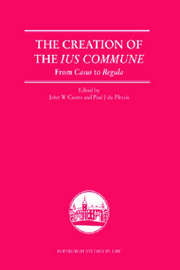Book contents
- Frontmatter
- Contents
- Preface
- List of Contributors
- List of Abbreviations
- Introduction
- 1 The Sources of Medieval Learned Law
- 2 The Infrastructure of the Early Ius Commune: The Formation of Regulae, or its Failure
- 3 Ius Quaerens Intellectum: The Method of the Medieval Civilians
- 4 Medieval Family and Marriage Law: From Actions of Status to Legal Doctrine
- 5 The Roman Concept of Ownership and the Medieval Doctrine of Dominium Utile
- 6 Succession to Fiefs: A Ius Commune Feudorum?
- 7 Towards the Medieval Law of Hypothec
- 8 The Ignorant Seller's Liability for Latent Defects: One Regula or Various Sets of Rules?
- 9 The Glossators' Monetary Law
- 10 Citations and the Construction of Procedural Law in the Ius Commune
- 11 Doctoribus bona dona danda sunt: Actions to Recover Unpaid Legal Fees
- Index
3 - Ius Quaerens Intellectum: The Method of the Medieval Civilians
Published online by Cambridge University Press: 12 September 2012
- Frontmatter
- Contents
- Preface
- List of Contributors
- List of Abbreviations
- Introduction
- 1 The Sources of Medieval Learned Law
- 2 The Infrastructure of the Early Ius Commune: The Formation of Regulae, or its Failure
- 3 Ius Quaerens Intellectum: The Method of the Medieval Civilians
- 4 Medieval Family and Marriage Law: From Actions of Status to Legal Doctrine
- 5 The Roman Concept of Ownership and the Medieval Doctrine of Dominium Utile
- 6 Succession to Fiefs: A Ius Commune Feudorum?
- 7 Towards the Medieval Law of Hypothec
- 8 The Ignorant Seller's Liability for Latent Defects: One Regula or Various Sets of Rules?
- 9 The Glossators' Monetary Law
- 10 Citations and the Construction of Procedural Law in the Ius Commune
- 11 Doctoribus bona dona danda sunt: Actions to Recover Unpaid Legal Fees
- Index
Summary
INTRODUCTION
In the West, since the time of the Roman jurists, the task of understanding and interpreting the law has usually belonged to a distinct class which a person can enter only after a long period of specialised study. Its members are united, not so much by agreement as to their conclusions, but by a common understanding of how conclusions are to be reached. They share a method which enables each jurist to arrive at opinions of his own and to explain why he agrees or disagrees with those of other jurists.
This chapter is about the method of the medieval civilians who expounded Roman law from the twelfth century, when the study of Roman law was revived, through the fourteenth century, when they produced their last great works.
Their task, as they conceived it, was to explain the texts compiled by the emperor Justinian in the sixth century and which became known as the Corpus iuris civilis. The largest part of the compilation, the Digest, was made up of short extracts from Roman jurists. Nevertheless, the method of the medieval civilians was unlike that of the Roman jurists. It will be helpful to say a few words about the Roman jurists in order to see how it was different.
Some scholars, such as Fritz Schultz and Peter Stein, believe that the Roman jurists learned to think systematically from the Greeks, and in particular from philosophers such as Aristotle. While the jurists' method was systematic, nevertheless it did not work in the same way.
- Type
- Chapter
- Information
- The Creation of the Ius CommuneFrom Casus to Regula, pp. 77 - 102Publisher: Edinburgh University PressPrint publication year: 2010



